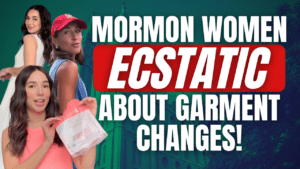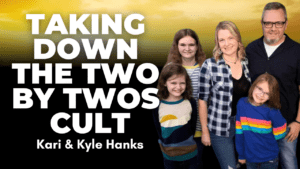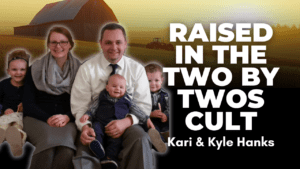Katie Harmon was raised Catholic in Laramie, Wyoming. After falling in love with a Mormon boy at age 15, Katie became socially/emotionally converted to the LDS Church in spite of…
- High ambitions for herself (Katie was a 4.0 student, got a 33 on her ACT, was in AP classes, got a full ride scholarship to the University of Wyoming, and wanted to become a doctor) and
- Strongly valuing social justice (e.g., anti-homophobia, anti-sexism, anti-racism).
As Katie became fully committed to the Mormon church, she saw her original aspirations slowly slip away, as she began to follow “the Mormon way for women.” Katie ended up:
- Experiencing severe Scrupulosity as a Mormon woman.
- Enduring an invasive and inappropriate “sexual repentance” process.
- Marrying 3 months after graduating high school to a man she had only known 7 months.
- Getting sealed to her husband while her non-LDS family sat outside the Mormon temple.
- Having three children within a short period of time before she felt ready to do so, based on LDS teachings.
- Feeling frustrated when, after her 2nd child was diagnosed with major health issues at 20 weeks, priesthood blessings failed to heal her ailing child. She basically discovered after conversion that the “Priesthood power” was not real, and did not work.
- Confronting the stifling ableism of Mormon doctrine, theology, and culture.
As Katie’s hopes and dreams began to fall apart, she began studying Mormonism more closely, and discovered that she was not taught as an investigator important truths about Mormon history and the LDS church that would likely have prevented her from joining.
Katie’s motivation for doing this interview is to call on the LDS Church to be fully honest in its missionary efforts, and in its education of children and youth, so that people like her can not be misled into joining and/or committing their lives to the Mormon church without being fully informed about its history, doctrine, and theology.




11 Responses
Katie, thank you so much for sharing your story. It helped me tap into some much needed compassion for myself. My story is so similar to yours that it was a bit triggering to listen but it also helped me to see myself and my own story in a different light. I was raised in Montana, raised Catholic, fell in love with the mission president’s son in high school. Baptized by him at 18 and on and on and on. I’ve been out of the church about 1 1/2 years and am so happy to be out (I’m 45 now). I really appreciate the informed consent focus of your message…so important!!
Anne
Hello,
Thank you for sharing your story. I just wanted to add that i was born in the church and definately was not taught any of the things discussed. I asked my seminary teacher directly when i was 17 years old “was Joseph Smith a polygamist” the answer was “no he was not”, so not only was i not informed but outright lied to. Thank you for addressing this. The Mormon church needs to take accountability for their lies, cover ups, gaslighting etc. These are people’s lives and feelings they are messing with.
This interview really resonated with me. Specifically the part of the Katie’s family not being able to attend her wedding. This happened to me this summer. I wasn’t able to see my middle son get married. It was the hardest, soul crushing experience to see my son and his mother walk in the temple and see the doors shut behind them. The “church” should be ashamed. This practice of excluding parents from their child’s wedding is so divisive and hurtful. What a horrible practice.
Stereotyping much? “Most Hispanics join because of Magical Thinking (i.e. Americans are rich so if I join this American church I’ll become rich too).” As a Hispanic man, I find your assertion utterly despicable and morally reprehensible.
I joined the Church because I believed in the message of the restored gospel. I once believed that. MOST Hispanics do join the Church with a testimony (or belief on a testimony) that the LDS Church and not based on your stereotypical nonsense. Some people may join, hoping to be wealthy as “rich” Americans, but not MOST.
Katie,
This is wonderful and I can’t add anything other than recommending Sara Hendren’s new book ‘What Can a Body Do?’ to everyone.
thanks again!
Steve
This story was moving and powerful. It’s interesting, the way Katie sets up her connection to the church as partially a reaction to her sister’s illness, but in the end, both she and her twin were in similar circumstances – both doing themselves harm in pursuit of a specific concept of perfection. Hers was just spiritual suffering while her sister’s was physical. I wish them both continued recovery. I’m so sad for what Katie describes going through. She’s so articulate and expressive – she makes it easy to empathize and understand.
The sexual third degree that both speakers describe in this horrifies me. (What possible bearing could it have on the sinfulness of an act if you orgasmed? Or didn’t?) It sounds nearly criminal to have an adult man asking sexual questions like that of a teenage child without any oversight by parents/psychologists/guardians ad litem. But then it also sounds criminal to hear about Joseph Smith telling 14 year old girls that the salvation of their family depends on them “marrying” him – that suggests that this is, if anything, better than its origins.
I am deeply suspicious of any “hide the ball” religion – whether Mormonism, Scientology, or any other religion with gnostic-style secrets that you only learn as you advance. Any religion that asks for a huge investment before telling you the truth about what you will be asked to believe is BANKING on the sunk cost fallacy to keep people on board. I remember the first time I asked a Mormon about whether it was true that God used to be a human or that humans could become Gods and get their own worlds (and was there a first God – an uber-God – or just an unending series of exalted people going back in time forever?), she said something about how that was all advanced stuff, and she’d need someone higher in the church to answer that kind of question. It felt like a natural response, and I accepted it. Until I got the same answer, nearly verbatim, from someone else. And then I realized that they taught them not to answer my question and what to say to avoid answering. And then I knew it was a corrupt institution, even though a number of very smart people whom I respected had experienced powerful spiritual conversions to join the faith. They actively train their members to conceal fundamental truths about what they believe.
In terms of reframing what a “disability” is, I think of humans with perfect pitch (are the 99.5% of us without it disabled?) or of aliens. Let’s say there are underwater aliens, and they take aquarium spaceships and encounter humans, and they think we are all crippled because we don’t have gills. And they promise if we convert to their religion, we’ll be “fixed” to have gills in the afterlife. That reminds me of people promising the disabled so-called “perfect” bodies in the afterlife – they are presupposing that the default, standard issue body they have is perfect and that the world we know is unchanging and the only kind of world there is. If there are “perfect” bodies in the afterlife, I don’t think we can make assumptions about what they would look like or how they would operate – since the entire paradigm would be different. (Maybe perfect bodies can fly?) Neurodiverse individuals can excel at jobs that neurotypical people are terrible at. That said, there are disabilities – particularly with being nonverbal or losing the ability to speak or understand written or spoken language – that I think are extremely hard on the people who have them and that society will have real trouble accommodating in the absence of some amazing mindreading future tech.
Not sure why the first commenter above made the comments he did about women MDs. I know a lot of them (and a lot of men MDs – my husband, my twin, and many friends are doctors). Some doctors, men and women, have kids, and some do not have kids (just like men and women who aren’t doctors), but all the doctors I know love their jobs (vs almost none of the lawyers). It is definitely much easier to become a doctor if you wait to have kids until after you are an attending, since the hours doctors work in residency make daycare not an option during that period (since daycares aren’t open 24 hours). Regardless of whether the doctors I know have kids, they all appreciate the chance to alleviate suffering, help babies be born, save lives, and enhance health/quality of life in other people. That’s more rewarding than big houses or trips, and I don’t see what women’s attractiveness to men at the age of 60 (!) has to do with that (or with anything). (Pretty sure our society as a whole undervalues older women. That said, if late-life romance is somehow a driving issue, my late grandmother started the last dalliance of her life in her 90s after my grandfather died and she and an elderly gentleman became enamored of one another. It ain’t over till it’s over.)
If she wants to, Katie could still become a doctor – I know mothers who have done it, though it is insanely hard while kids are young. She’s obviously extremely smart and has some clinical skills and experience. Regardless of what she does, I wish her the best in all her future endeavors.
Love that you pointed out that even normal human beings endure accidents & health crisis that render them in less than perfect health. What do we do w/ them? We get them help, serve them & try to heal them as best we can.
Disgracefully & disgustingly, very UT Mormon TBM Family, threw their mom away when they deemed her ‘too broken’ from disease. Unbelievably, Mom’s unsympathetic family of hypocrites includes a Serving Bishop & his wife, a middle school principal, a BYU teacher, the daughter of an RN & her husband, & a home health agency owner. Seems Saving $$ their inheritance was much more important to them! It’s an all out war against the elderly these days. It’s called ‘The Silent Holocaust’. Please Google it.
On a better note- Wondering how your 2nd son is doing now. How old is he? What are his capabilities? His joys? Your joys? How does he fit in the family? We can learn a lot loving and serving those w/ special needs, while learning to expect less than perfect from others..
Correction- It’s the ‘Invisible Holocaust’- negating the lives of our dearly loved elderly.
I left the church due to ableism, ironically as a kid and a young adult I was treated kindly by all, I guess I was the kid with special needs due to cerebral palsy so people were kind and supportive. When I asked about whether I could serve a mission I was told yes only to be told no for two years until the local leaders convinced to General Authorities to let me go. I served a two year proselyting mission, came home and became severely depressed, like many others, that was 30 years ago.
About 10 years ago the ward boundaries were changed and my family and I ended up in a new ward where some people would avoid me and not speak to me, so we stopped going, I started googling about the church and discovered the fraud.
Katie your story was great to listen to, ableism is too often not even considered. In 2018 I completed a PhD in disability studies I suppose you could say. Old Ezra Taft Benson who called me on a mission would be rolling in his grave hearing you refer to the social model of disability which was first proposed by men with spinal cord injuries who were proponents of socialism who fled South Africa during apartheid.
For anyone interested I have listed a couple of references that provide the context and description of various thinking about disability.
Oliver, M. (2009). Understanding disability: from theory to practice. New York: Palgrave Macmillan.
Shakespeare, T. (2013). Disability Rights and Wrongs Revisited (2 ed.). Hoboken: Taylor and Francis.
Campbell, F. K. (2009). Contours of ableism: Palgrave Macmillan Basingstoke.
If you can’t obtain these books, just google them and you’ll find the writings of their authors which will give you insight without reading entire books!
Better investment of time than reading the Book of Mormon- money back guarantee
Why is “ableism” in quotations. It’s the accepted word meaning the discrimination against the disabled. No different than sexism/racism/etc. It’s extremely dismissive to put it in quotations.
Regarding the questioning between older men of the church and young women alone in room with him…Not “bordering on abusive”. It IS abusive and I can feel no other way than that is the man being WAY too sexually creepy pervert abusive.